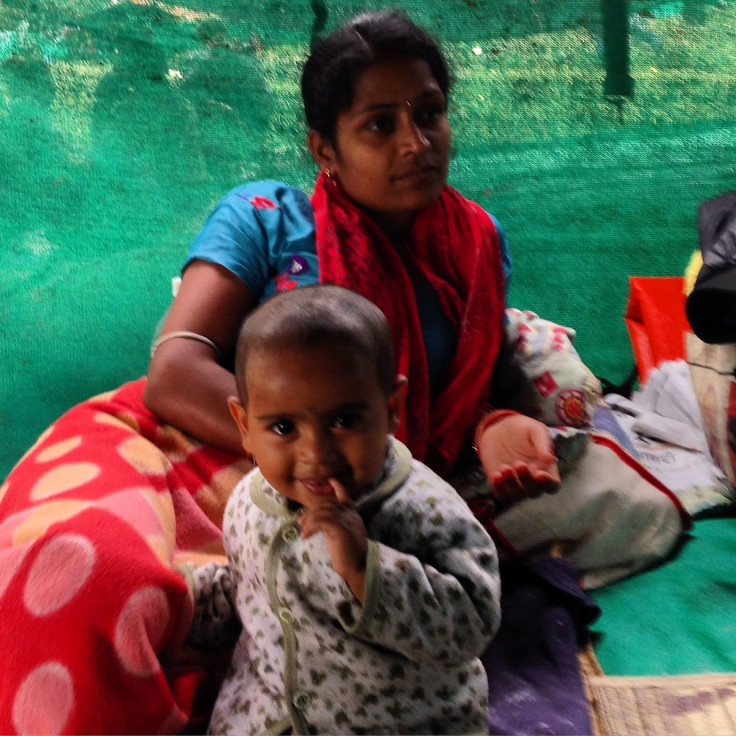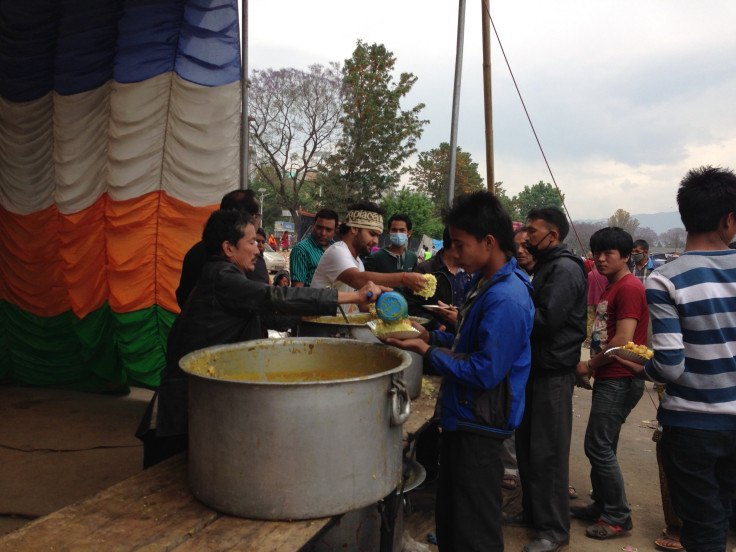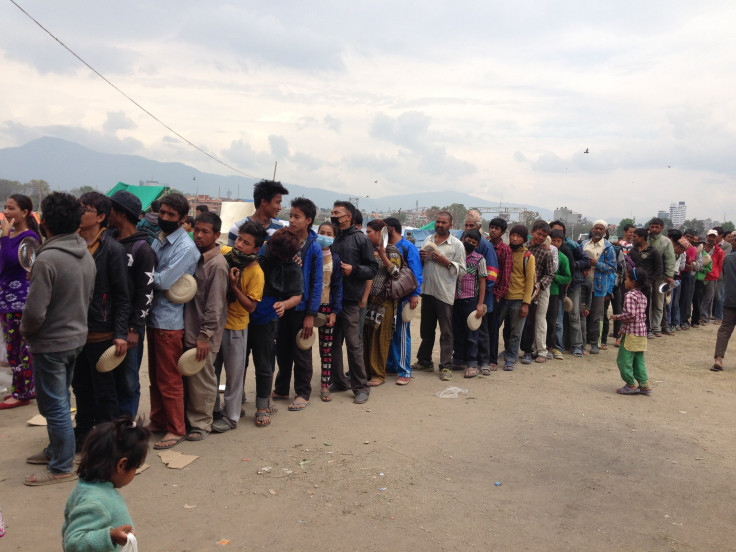Nepal Earthquake Update: In Kathmandu’s Tent City, Government Services Few And Far Between
KATHMANDU, Nepal -- The Tudikhel grounds in the middle of Kathmandu has quickly morphed from a public park and army parade space to a sprawling encampment full of earthquake survivors, too afraid to return to their homes. Families slept in cramped tents for the fourth night in a row since Saturday’s massive magnitude-7.8 quake, subsisting off limited portions of food and water. Meanwhile, government-provided services were few and far between, if they could be found at all, and only limited help was provided by local private groups.
Private companies and nongovernmental organizations have been the main sources of relief for those camped out at Tudikhel. Dozens of evacuees lined up single-file in a long queue for a modest portion of rice and dal, a common dish made with dried legumes, from a handful of volunteers from Patajuli, a local civil society group.
For some in the camp, like Harendra, a fruit shop owner who provided only his first name, the food from Patajuli may be his family’s only source of sustenance after they finish the last of a small stock of vegetables and fruits he salvaged from their home after the quake. He shares a cramped tent with his brother and both their families, totaling 11 people, and their available food has stretched to feed everyone so far. But on Tuesday the vegetables were almost finished, and the supply of fruit from his shop had already begun rotting.
“There has not really been any organized help, especially from the government,” he said. Most of the people around him were subsisting off one or two small meals a day from food they had brought from home. In recent days, groups like Patajuli and some private companies had just started to bring in donated services.



Rabindra Khatri, an employee of mineral water company Steam, had just finished delivering 2,500 liters of water to the camp. He had just begun delivering free water to several tent communities across Kathmandu on Tuesday, hoping it would help keep survivors afloat. “Diseases will spread without water, so I decided to help out,” he said. A few feet away, another private company, Dhaulagiri, had just finished dropping off its own water delivery.
Any visible government services were minuscule in proportion to the scale of need at Tudikhel. In a camp full of hundreds of people, there were two or three available portable toilets supplied by the government. Many of the survivors sought relief in a chosen spot near the center of the grounds.
The open-air “toilets” were the most difficult thing about living in the camps, said 13-year-old Neha Patel, an eighth-grade student. “There’s no separation between boys and girls,” she said.
The situation has raised anxiety over the spread of diseases, but there were few other options in the camp, particularly for those who no longer had homes to which they could return. “We are scared, but what can we do?” said Neha’s mother, Nandadevi Patel.
On a far edge of the tent community, army soldiers could be seen shoveling an area clear of human waste. In other parts of Tudikhel, employees from private organizations were taking it upon themselves to clean.
Neha and Nandadevi Patel shared space under a thin tarp alongside two other families they had known before the quake. They had been subsisting mainly on biscuits and water, eating about once a day. They didn’t have any cooking materials. “Nobody has come by to ask what we need,” Nandadevi said.
And while they were able to live off the water provided by companies like Steam and Daulaghiri, Nandadevi was nervous about it. “It tastes different from the water I usually drink,” she said. “We’re unsure if it is safe.”
Neha, Nandadevi, and the two others in their immediate family -- Nandadevi’s husband and 5-year-old son -- didn’t think they would be able to return to their five-story apartment building that had cracked badly after Saturday’s quake. They had a small plot of land in Bara district, about 80 miles outside Kathmandu, which appeared to be the only viable living option they had left.
Nandadevi said they would take the next bus out to Bara district as soon as they could. But bus tickets had gotten expensive in recent days as Nepalis, many trying to reach families outside Kathmandu, streamed out of the city.
“I’ve lived in Kathmandu for five or six years, and already made friends here,” Neha said. “Starting over again will be difficult.”
Strong gusts of wind began whipping up the edges of the makeshift tents as the sky turned overcast Tuesday afternoon. Parents rushed to bring children under shelter, and at the park’s entrance, a young boy picked up bricks from a collapsed entry gate to keep his tent grounded. As the afternoon ticked by, a small trickle of rain turned into a downpour, and families crouched in their small spaces, huddling for warmth.
Brianna Lee reported from Nepal with travel provided by the International Reporting Project (IRP).
© Copyright IBTimes 2025. All rights reserved.






















